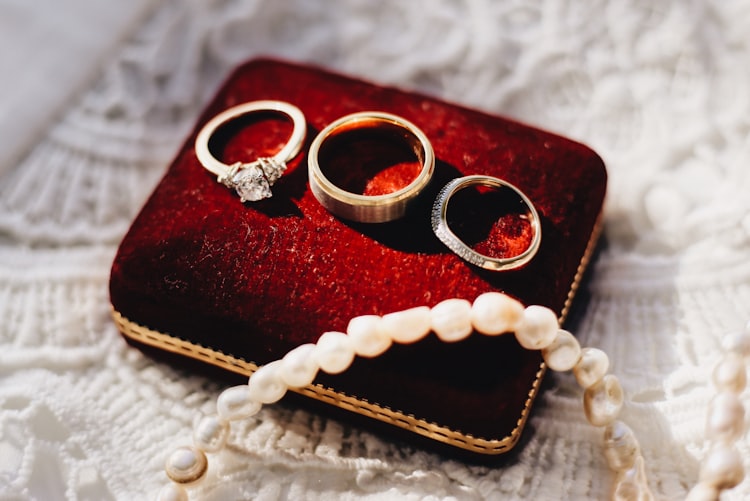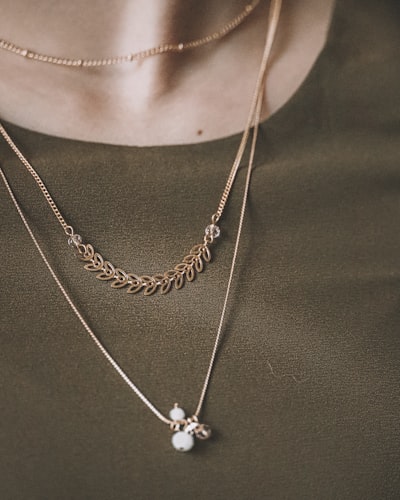
How Does Jewelry Insurance Work?
People have the tendency to insure their expensive possessions, such as homes and vehicles, but jewelry is often overlooked. While it isn't a widely known concept, jewelry insurance serves the important purpose of preventing substantial financial loss if one of your jewelry items is damaged, lost, or stolen. It's a smart investment that gives you absolute peace of mind whether you wear your jewelry frequently or keep it at home. Discover everything you need to know about jewelry insurance in this comprehensive guide.
Do You Really Need Jewelry Insurance?

Image via Unsplash by fallonmichaeltx
If you own a piece of jewelry that's expensive or has sentimental value, such as an engagement or wedding ring, it's worthwhile to consider getting jewelry insurance. Whether it's a ring, bracelet, or necklace, a jewelry item can easily go missing because you often have to remove it when you wash your hands, apply lotion, or go swimming. Also, it may sustain scratches, dents, or other forms of damage as you go about your daily activities. Since it's a valuable item, your jewelry piece is also at a higher risk of being stolen compared to your other personal belongings.
Most jewelry items come with a lifetime warranty, but it's important to note that the warranty only covers repairs. This means you aren't protected against loss or theft. Fortunately, it's easy to get jewelry insurance and file a claim online if something bad happens.
How Does Jewelry Insurance Work?
There are basically two types of jewelry insurance: reimbursement and replacement. Reimbursement jewelry insurance follows the traditional insurance model, which is the typical structure for jewelry coverage under a homeowners' insurance policy. After you purchase this type of insurance, you're entitled to file a claim if your jewelry is lost, destroyed, or stolen. Once the claim is settled, your insurer will reimburse you for your loss.
The amount of reimbursement you receive may be calculated based on either actual cash value or replacement cost. Actual cash value refers to the replacement value of the lost or damaged jewelry item minus depreciation. Replacement cost, on the other hand, is the dollar amount required to replace the piece without deducting for depreciation, but it can't exceed the maximum dollar amount specified in the policy.
If you opt for a replacement jewelry insurance policy, you don't have to concern yourself with how your insurance provider calculates your reimbursement. You'll receive a jewelry piece that's identical to the one you lost, provided you aren't underinsured. With this type of jewelry coverage, you're typically required to work with a designated jeweler or repair shop to settle your claim.
Does Your Homeowners' Insurance Policy Cover Your Jewelry?
Jewelry is one type of item covered by many homeowners' insurance policies, but it's regarded as a “non-essential” household item, which tends to get limited coverage. As such, you may not have your damaged or stolen jewelry item replaced or reimbursed at full value. Also, homeowners' insurance generally doesn't cover jewelry that's simply lost or stolen outside your home. You should carefully go through your homeowners' policy to find out what it actually covers before you decide whether you should purchase jewelry insurance.
What Does Jewelry Insurance Cover?
Typically, a good jewelry insurance policy will cover the full value of a jewelry item in the event of damage, loss, theft, or mysterious disappearance. The coverage includes common types of loss such as having your earrings stolen from your vehicle, dropping your ring down a sink, cracking your gemstone on the edge of your dinner table, or just having no clue where your gold watch went.
Usually, a jewelry insurance policy provides “all perils” coverage, meaning your jewelry will be covered regardless of the cause of the loss or damage, as long as it isn't one of the excluded causes. Examples of excluded causes include:
- Normal wear and tear.
- Intentional acts.
- Voluntary parting.
- Pest infestation.
- Military action.
- Civil authority.
- Nuclear hazard.
When you're getting jewelry insurance, it's essential to choose a policy that includes worldwide coverage. You may leave a jewelry item behind in your hotel room or become a victim of theft while traveling. Having global coverage ensures you'll get a replacement or adequate reimbursement if your jewelry is lost or damaged during an overseas trip.
What Types of Jewelry Can You Insure?
Image via Unsplash by jphotomedia
In general, jewelry insurance offers protection for all types of jewelry, including engagement rings, wedding bands, necklaces, earrings, bracelets, watches, and even loose stones that are being set. A homeowners' insurance policy, on the other hand, may only cover certain types of jewelry, such as rings, watches, and antique jewelry.
Should You Buy a Blanket Policy for Your Entire Jewelry Collection or Insure Your Pieces Individually?
The choice between getting a blanket policy and insuring individual items is a matter of personal preference. It's highly recommended that you insure your wedding band or engagement ring separately. These items are high-value pieces that are worn on a regular basis, so they are more likely to get lost, damaged, or stolen. You can also purchase a blanket policy for all your jewelry, but you need to have every piece in your collection appraised so that the insurance company can calculate their total replacement value.
What's the Cost of Jewelry Insurance?
The premium for jewelry insurance is typically 1% to 2% of the value of your jewelry. However, it may vary depending on your chosen deductible, which is the amount you'll pay out of your own pocket if you end up filing a claim. Usually, a higher deductible means a lower premium, while a lower deductible results in a higher premium.
How Do You Insure Your Jewelry?
If you want to insure your jewelry, you need to contact an insurer that offers jewelry insurance and provide the following documents:
- Receipts.
- Certificates.
- Appraisals.
- Photos of your jewelry items.
If you're looking for a reputable jeweler that provides accurate appraisals for insurance purposes, feel free to speak with the helpful and friendly staff at Unique Gold & Diamonds. Contact us today!




